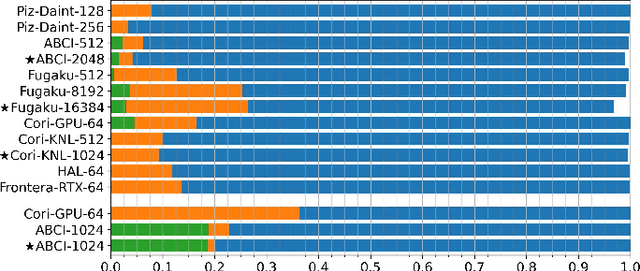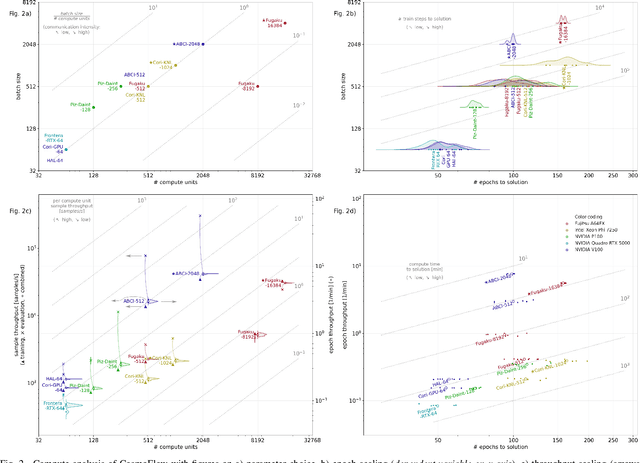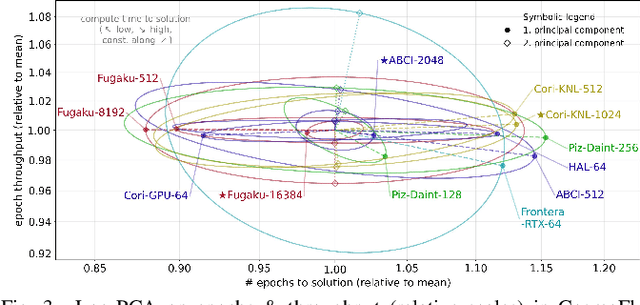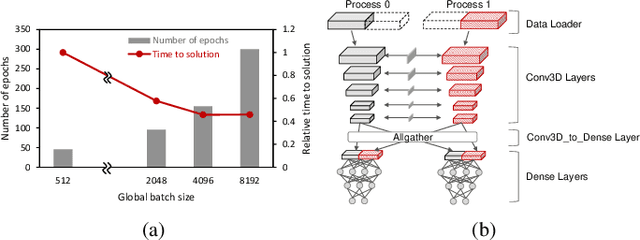Jan Balewski
MLPerf HPC: A Holistic Benchmark Suite for Scientific Machine Learning on HPC Systems
Oct 26, 2021



Abstract:Scientific communities are increasingly adopting machine learning and deep learning models in their applications to accelerate scientific insights. High performance computing systems are pushing the frontiers of performance with a rich diversity of hardware resources and massive scale-out capabilities. There is a critical need to understand fair and effective benchmarking of machine learning applications that are representative of real-world scientific use cases. MLPerf is a community-driven standard to benchmark machine learning workloads, focusing on end-to-end performance metrics. In this paper, we introduce MLPerf HPC, a benchmark suite of large-scale scientific machine learning training applications driven by the MLCommons Association. We present the results from the first submission round, including a diverse set of some of the world's largest HPC systems. We develop a systematic framework for their joint analysis and compare them in terms of data staging, algorithmic convergence, and compute performance. As a result, we gain a quantitative understanding of optimizations on different subsystems such as staging and on-node loading of data, compute-unit utilization, and communication scheduling, enabling overall $>10 \times$ (end-to-end) performance improvements through system scaling. Notably, our analysis shows a scale-dependent interplay between the dataset size, a system's memory hierarchy, and training convergence that underlines the importance of near-compute storage. To overcome the data-parallel scalability challenge at large batch sizes, we discuss specific learning techniques and hybrid data-and-model parallelism that are effective on large systems. We conclude by characterizing each benchmark with respect to low-level memory, I/O, and network behavior to parameterize extended roofline performance models in future rounds.
The Case for Strong Scaling in Deep Learning: Training Large 3D CNNs with Hybrid Parallelism
Jul 25, 2020Abstract:We present scalable hybrid-parallel algorithms for training large-scale 3D convolutional neural networks. Deep learning-based emerging scientific workflows often require model training with large, high-dimensional samples, which can make training much more costly and even infeasible due to excessive memory usage. We solve these challenges by extensively applying hybrid parallelism throughout the end-to-end training pipeline, including both computations and I/O. Our hybrid-parallel algorithm extends the standard data parallelism with spatial parallelism, which partitions a single sample in the spatial domain, realizing strong scaling beyond the mini-batch dimension with a larger aggregated memory capacity. We evaluate our proposed training algorithms with two challenging 3D CNNs, CosmoFlow and 3D U-Net. Our comprehensive performance studies show that good weak and strong scaling can be achieved for both networks using up 2K GPUs. More importantly, we enable training of CosmoFlow with much larger samples than previously possible, realizing an order-of-magnitude improvement in prediction accuracy.
 Add to Chrome
Add to Chrome Add to Firefox
Add to Firefox Add to Edge
Add to Edge